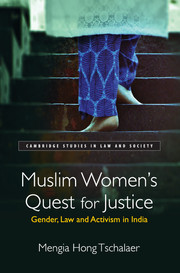
- Publisher:
- Cambridge University Press
- Online publication date:
- February 2018
- Print publication year:
- 2017
- Online ISBN:
- 9781316659236
- Subjects:
- Sociology of Gender, Socio-Legal Studies, Law, Sociology

This book is an urban ethnographic study of several Muslim women's organisations in northern India. These organisations work to carve out spaces that allow for the articulation of alternative experiences and conceptions of religion and justice that challenge Islamic orthodoxy as well as the monopoly of the Indian state in the domain of family law. While most analyses on reform efforts within Muslim family law in India have focused on women's protection within the state legal system, this book offers the rare opportunity to understand how organised groups of Muslim women's rights activists contest marginalising forces present in the family and criminal courts, Shariat courts, local mosques, workplace, legislature and legal documents. It pushes against troubling assumptions that Islam is incompatible with ideas of women's rights and that the State is the only dispenser of justice, and offers new directions for studies on the dispersed nature of women's identities in Islamic family law.
‘Muslim Women's Quest for Justice is a highly significant, timely, and rigorous intervention that challenges modernist accounts of law and liberal categories of women's rights and justice through a nuanced and sophisticated ethnographic analysis of gender justice. The study not only challenges the dichotomy between state and non-state law, but also how Islam is invariably set up as an obstacle to the pursuit of gender justice in liberal accounts. Hong Tschalaer uncovers the layered and polycentric legal landscape that structure Muslim women's activist's pursuit of socio-legal reform outside of state legal systems and in the process fragments and pluralises the categories of Islam and gender justice. This book marks a vital contribution to critical feminist and anthropological literature that examines the complex and contradictory terrain of justice, law and rights in a ideologically and political fragmented world.'
Ratna Kapur - Queen Mary University of London
‘Mengia Hong Tschalaer's book presents a very rich and unique ethnographic account of Muslim women's activist organizations in urban north India that provide informal dispute resolution options for women experiencing domestic violence, dowry harassment, spousal neglect or desertion and other marital problems. One strength lies in its many extended case studies of litigants who were interviewed personally and/or observed while seeking justice, not only in such venues but also in a local qazi's court and in the official Family and Magistrates Courts. But equally impressive is the way in which the author places her empirical research findings within a theoretical context, showing their relevance to current debates in India over whether non-state quasi-judicial institutions are beneficial or harmful for Muslim women or should even be permitted to continue to operate. Her work will be required reading for anyone concerned with issues of gender and the law, not only with respect to Indian Muslim women but for those living in other countries characterized by pluralistic legal systems.'
Sylvia Vatuk - University of Illinois, Chicago
‘A timely, sophisticated, and refreshing intervention in debates about the uniform civil code in India. This richly detailed ethnography of legal spaces in Lucknow provides a multidimensional account of Muslim women's activism, captures the constraining and transformative aspects of litigants' quest for justice, and powerfully illuminates the significance of legal pluralism as a resource for gender equality in Muslim family law.'
Gopika Solanki - Carleton University, Canada
'Carefully historicized and brimming with nuanced analysis, this book shows the discursive and political strategies through which overlapping and at times competing women’s organizations navigate a contested and complicated public sphere, as they seek to curate a gender emancipatory understanding of Islam. The major strength of this book is the way it presents a vivid picture of the quest for gender justice on the ground, leavened by such critical processes as the composition of gender-just nikah-namas. This important book will engage the interests of a range of scholars and courses on Islam, gender, South Asia, and Islamic law and society.'
SherAli Tareen Source: New Books Network (www.newbooksnetwork.com)
 Loading metrics...
Loading metrics...
* Views captured on Cambridge Core between #date#. This data will be updated every 24 hours.
Usage data cannot currently be displayed.